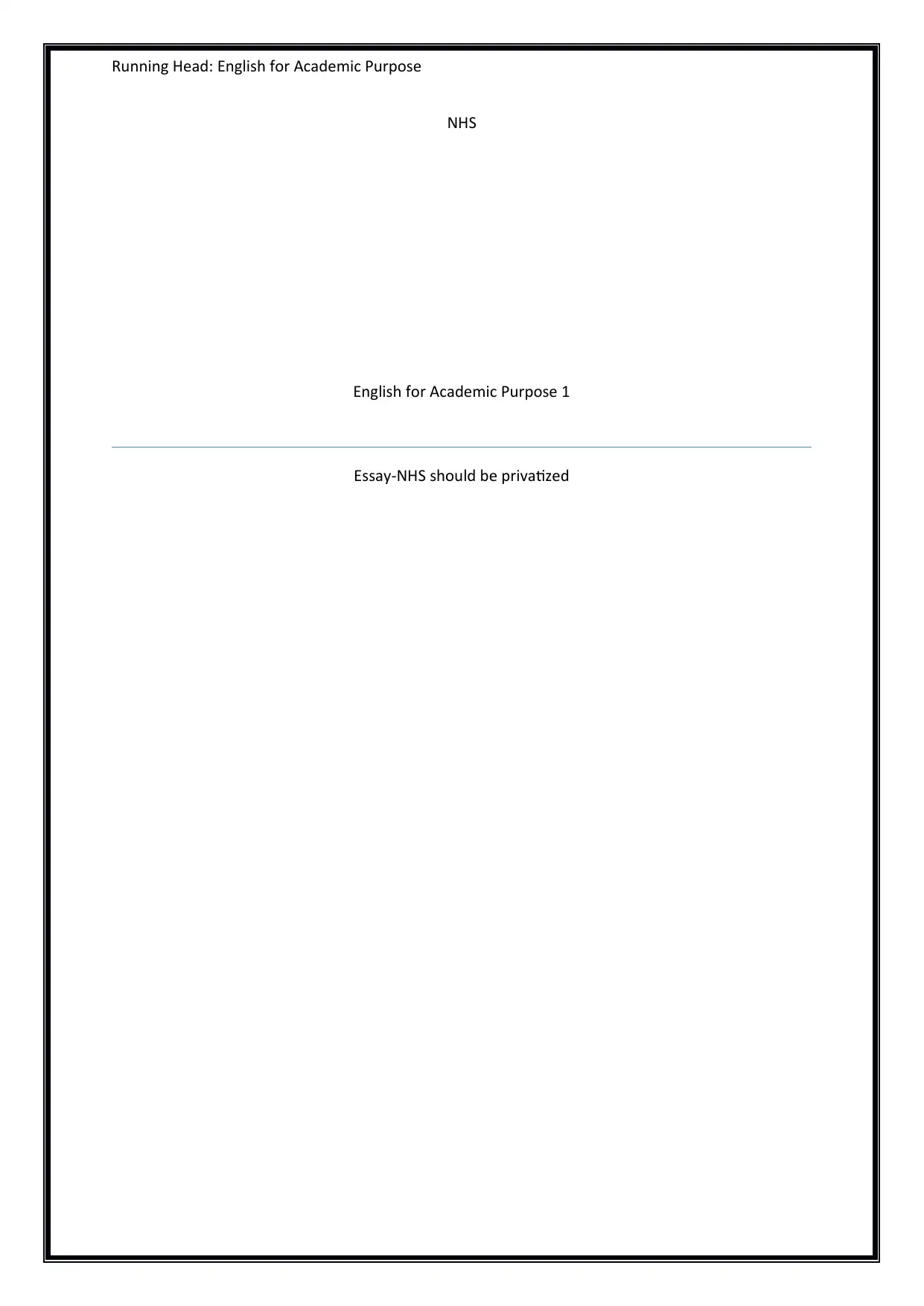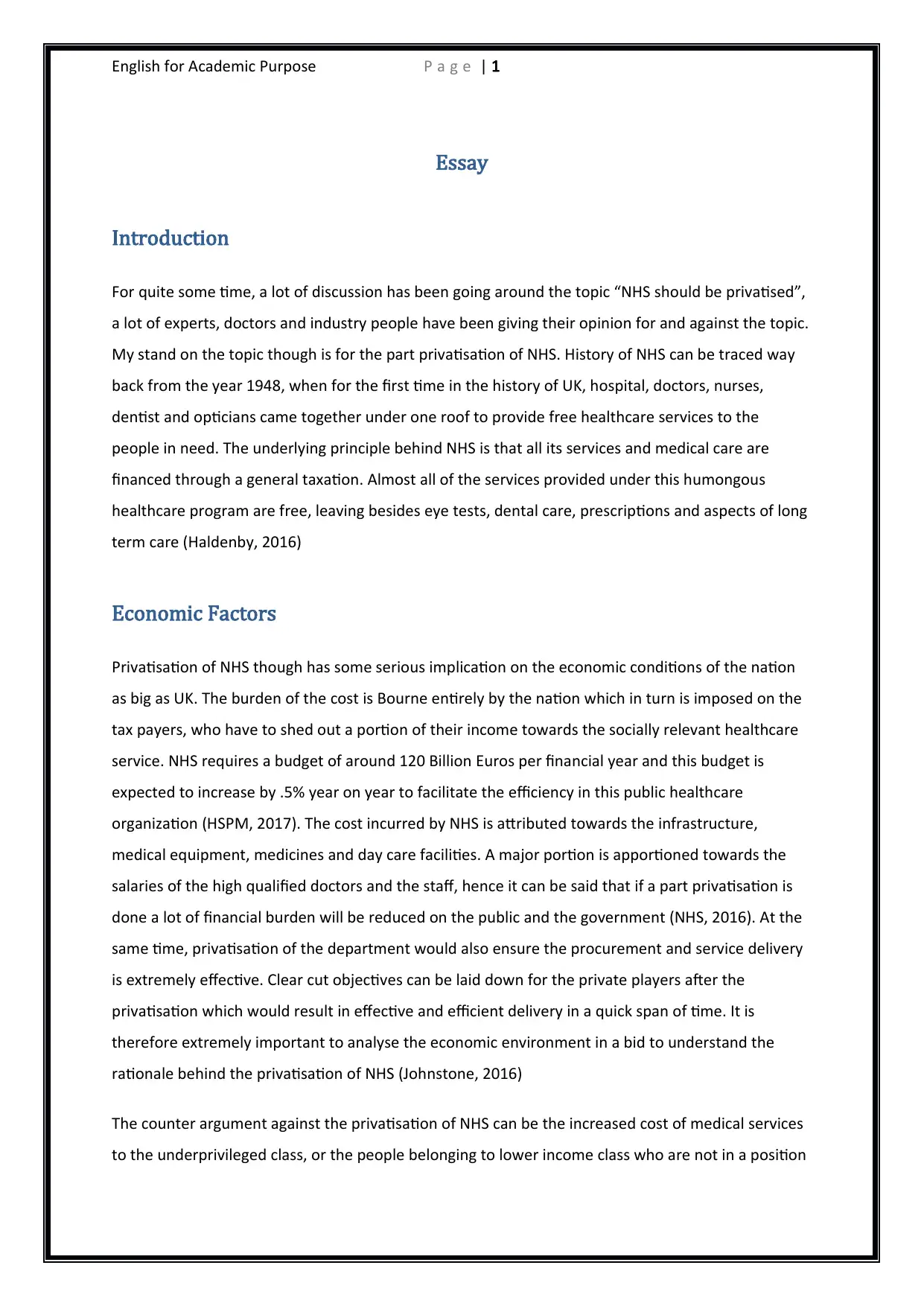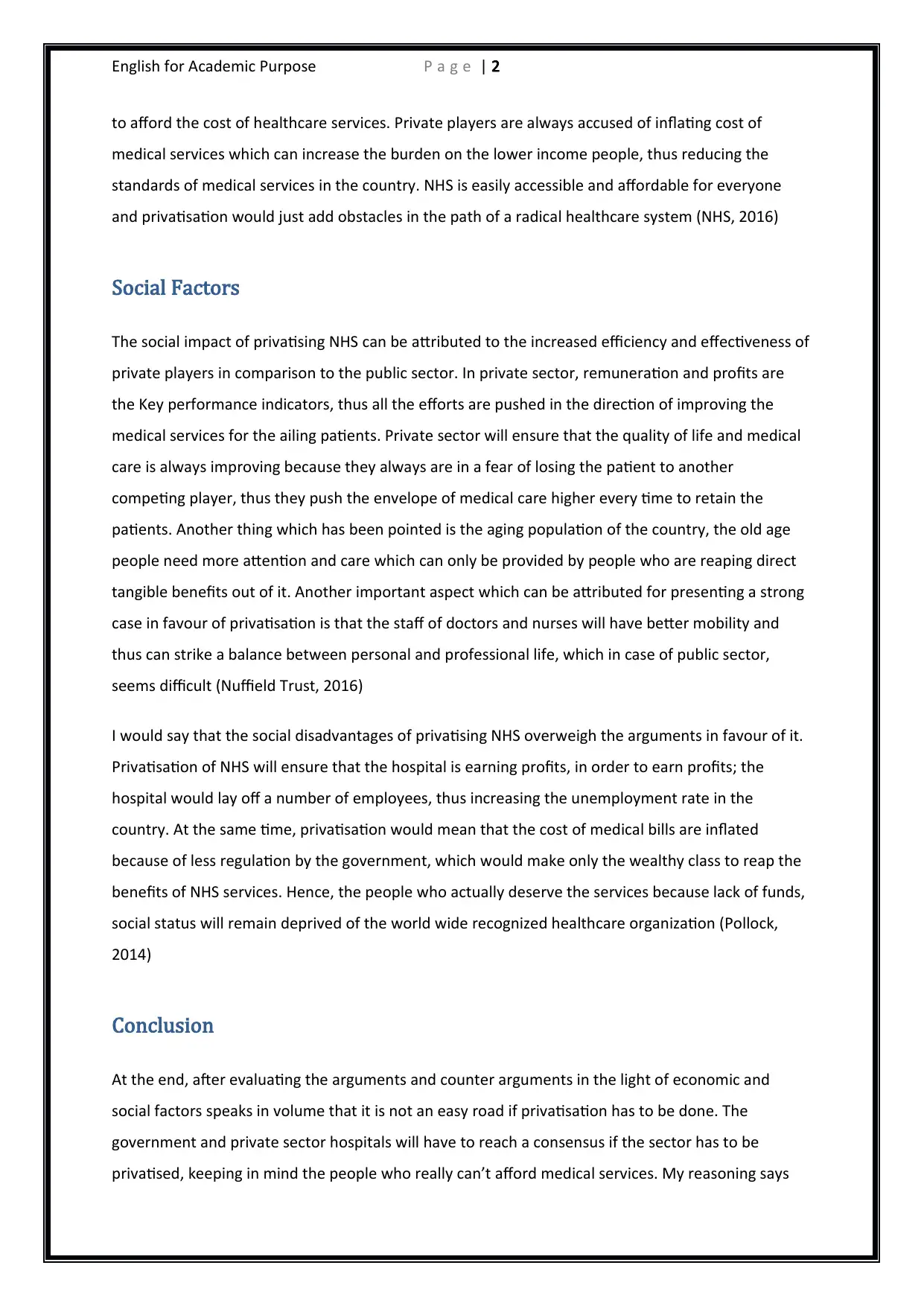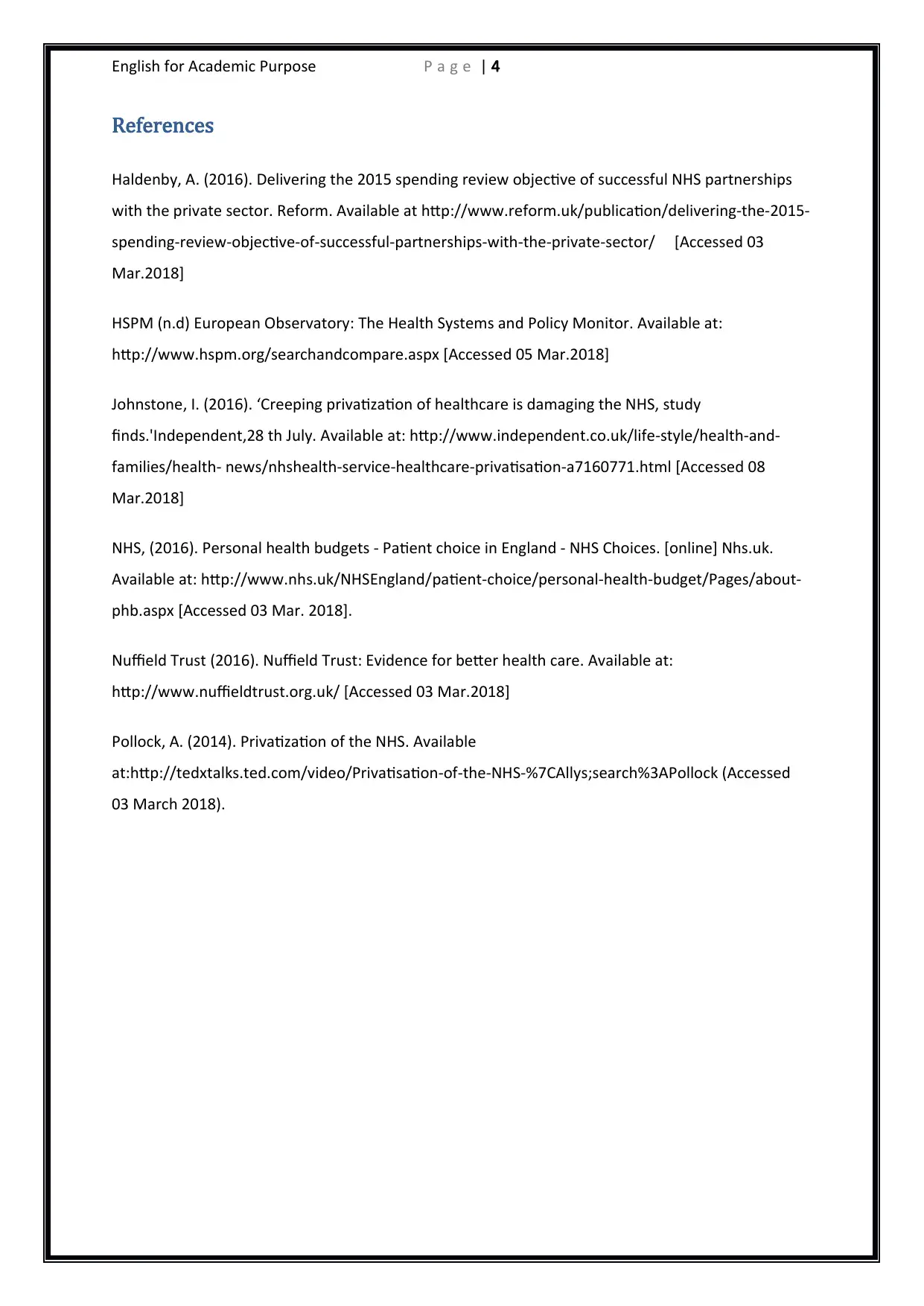Essay on Privatization of NHS: Economic and Social Considerations
VerifiedAdded on 2021/04/21
|5
|1220
|23
Essay
AI Summary
This essay examines the contentious issue of NHS privatization, arguing for a part privatization model. It begins by outlining the history and principles of the NHS, emphasizing its role in providing free healthcare financed through general taxation. The essay then delves into the economic implications of privatization, discussing the financial burden on taxpayers and the potential for increased efficiency through private sector involvement. It acknowledges counterarguments, such as increased costs for the underprivileged. The essay also explores the social factors, including the potential for improved medical services, the needs of an aging population, and the impact on healthcare professionals. It concludes by suggesting a part privatization approach, where subsidized rates are offered to lower-income individuals while standard rates are charged to the wealthy, ensuring enhanced healthcare services and reduced economic burden. The essay references several sources to support its arguments.

Running Head: English for Academic Purpose
NHS
English for Academic Purpose 1
Essay-NHS should be privatized
NHS
English for Academic Purpose 1
Essay-NHS should be privatized
Paraphrase This Document
Need a fresh take? Get an instant paraphrase of this document with our AI Paraphraser

English for Academic Purpose P a g e | 1
Essay
Introduction
For quite some time, a lot of discussion has been going around the topic “NHS should be privatised”,
a lot of experts, doctors and industry people have been giving their opinion for and against the topic.
My stand on the topic though is for the part privatisation of NHS. History of NHS can be traced way
back from the year 1948, when for the first time in the history of UK, hospital, doctors, nurses,
dentist and opticians came together under one roof to provide free healthcare services to the
people in need. The underlying principle behind NHS is that all its services and medical care are
financed through a general taxation. Almost all of the services provided under this humongous
healthcare program are free, leaving besides eye tests, dental care, prescriptions and aspects of long
term care (Haldenby, 2016)
Economic Factors
Privatisation of NHS though has some serious implication on the economic conditions of the nation
as big as UK. The burden of the cost is Bourne entirely by the nation which in turn is imposed on the
tax payers, who have to shed out a portion of their income towards the socially relevant healthcare
service. NHS requires a budget of around 120 Billion Euros per financial year and this budget is
expected to increase by .5% year on year to facilitate the efficiency in this public healthcare
organization (HSPM, 2017). The cost incurred by NHS is attributed towards the infrastructure,
medical equipment, medicines and day care facilities. A major portion is apportioned towards the
salaries of the high qualified doctors and the staff, hence it can be said that if a part privatisation is
done a lot of financial burden will be reduced on the public and the government (NHS, 2016). At the
same time, privatisation of the department would also ensure the procurement and service delivery
is extremely effective. Clear cut objectives can be laid down for the private players after the
privatisation which would result in effective and efficient delivery in a quick span of time. It is
therefore extremely important to analyse the economic environment in a bid to understand the
rationale behind the privatisation of NHS (Johnstone, 2016)
The counter argument against the privatisation of NHS can be the increased cost of medical services
to the underprivileged class, or the people belonging to lower income class who are not in a position
Essay
Introduction
For quite some time, a lot of discussion has been going around the topic “NHS should be privatised”,
a lot of experts, doctors and industry people have been giving their opinion for and against the topic.
My stand on the topic though is for the part privatisation of NHS. History of NHS can be traced way
back from the year 1948, when for the first time in the history of UK, hospital, doctors, nurses,
dentist and opticians came together under one roof to provide free healthcare services to the
people in need. The underlying principle behind NHS is that all its services and medical care are
financed through a general taxation. Almost all of the services provided under this humongous
healthcare program are free, leaving besides eye tests, dental care, prescriptions and aspects of long
term care (Haldenby, 2016)
Economic Factors
Privatisation of NHS though has some serious implication on the economic conditions of the nation
as big as UK. The burden of the cost is Bourne entirely by the nation which in turn is imposed on the
tax payers, who have to shed out a portion of their income towards the socially relevant healthcare
service. NHS requires a budget of around 120 Billion Euros per financial year and this budget is
expected to increase by .5% year on year to facilitate the efficiency in this public healthcare
organization (HSPM, 2017). The cost incurred by NHS is attributed towards the infrastructure,
medical equipment, medicines and day care facilities. A major portion is apportioned towards the
salaries of the high qualified doctors and the staff, hence it can be said that if a part privatisation is
done a lot of financial burden will be reduced on the public and the government (NHS, 2016). At the
same time, privatisation of the department would also ensure the procurement and service delivery
is extremely effective. Clear cut objectives can be laid down for the private players after the
privatisation which would result in effective and efficient delivery in a quick span of time. It is
therefore extremely important to analyse the economic environment in a bid to understand the
rationale behind the privatisation of NHS (Johnstone, 2016)
The counter argument against the privatisation of NHS can be the increased cost of medical services
to the underprivileged class, or the people belonging to lower income class who are not in a position

English for Academic Purpose P a g e | 2
to afford the cost of healthcare services. Private players are always accused of inflating cost of
medical services which can increase the burden on the lower income people, thus reducing the
standards of medical services in the country. NHS is easily accessible and affordable for everyone
and privatisation would just add obstacles in the path of a radical healthcare system (NHS, 2016)
Social Factors
The social impact of privatising NHS can be attributed to the increased efficiency and effectiveness of
private players in comparison to the public sector. In private sector, remuneration and profits are
the Key performance indicators, thus all the efforts are pushed in the direction of improving the
medical services for the ailing patients. Private sector will ensure that the quality of life and medical
care is always improving because they always are in a fear of losing the patient to another
competing player, thus they push the envelope of medical care higher every time to retain the
patients. Another thing which has been pointed is the aging population of the country, the old age
people need more attention and care which can only be provided by people who are reaping direct
tangible benefits out of it. Another important aspect which can be attributed for presenting a strong
case in favour of privatisation is that the staff of doctors and nurses will have better mobility and
thus can strike a balance between personal and professional life, which in case of public sector,
seems difficult (Nuffield Trust, 2016)
I would say that the social disadvantages of privatising NHS overweigh the arguments in favour of it.
Privatisation of NHS will ensure that the hospital is earning profits, in order to earn profits; the
hospital would lay off a number of employees, thus increasing the unemployment rate in the
country. At the same time, privatisation would mean that the cost of medical bills are inflated
because of less regulation by the government, which would make only the wealthy class to reap the
benefits of NHS services. Hence, the people who actually deserve the services because lack of funds,
social status will remain deprived of the world wide recognized healthcare organization (Pollock,
2014)
Conclusion
At the end, after evaluating the arguments and counter arguments in the light of economic and
social factors speaks in volume that it is not an easy road if privatisation has to be done. The
government and private sector hospitals will have to reach a consensus if the sector has to be
privatised, keeping in mind the people who really can’t afford medical services. My reasoning says
to afford the cost of healthcare services. Private players are always accused of inflating cost of
medical services which can increase the burden on the lower income people, thus reducing the
standards of medical services in the country. NHS is easily accessible and affordable for everyone
and privatisation would just add obstacles in the path of a radical healthcare system (NHS, 2016)
Social Factors
The social impact of privatising NHS can be attributed to the increased efficiency and effectiveness of
private players in comparison to the public sector. In private sector, remuneration and profits are
the Key performance indicators, thus all the efforts are pushed in the direction of improving the
medical services for the ailing patients. Private sector will ensure that the quality of life and medical
care is always improving because they always are in a fear of losing the patient to another
competing player, thus they push the envelope of medical care higher every time to retain the
patients. Another thing which has been pointed is the aging population of the country, the old age
people need more attention and care which can only be provided by people who are reaping direct
tangible benefits out of it. Another important aspect which can be attributed for presenting a strong
case in favour of privatisation is that the staff of doctors and nurses will have better mobility and
thus can strike a balance between personal and professional life, which in case of public sector,
seems difficult (Nuffield Trust, 2016)
I would say that the social disadvantages of privatising NHS overweigh the arguments in favour of it.
Privatisation of NHS will ensure that the hospital is earning profits, in order to earn profits; the
hospital would lay off a number of employees, thus increasing the unemployment rate in the
country. At the same time, privatisation would mean that the cost of medical bills are inflated
because of less regulation by the government, which would make only the wealthy class to reap the
benefits of NHS services. Hence, the people who actually deserve the services because lack of funds,
social status will remain deprived of the world wide recognized healthcare organization (Pollock,
2014)
Conclusion
At the end, after evaluating the arguments and counter arguments in the light of economic and
social factors speaks in volume that it is not an easy road if privatisation has to be done. The
government and private sector hospitals will have to reach a consensus if the sector has to be
privatised, keeping in mind the people who really can’t afford medical services. My reasoning says
⊘ This is a preview!⊘
Do you want full access?
Subscribe today to unlock all pages.

Trusted by 1+ million students worldwide

English for Academic Purpose P a g e | 3
that the NHS be part privatised in the sense, People who are below a certain category to avail the
same services with enhanced medical care and subsidized rates, and the wealthy people to be
charged according to the standard rates. This will ensure that the envelope of health care services is
pushed higher and the economic burden does not falls on the lower income people. Government
discretion would also be required to monitor if the hospital is taking and treating cases according to
the vision set for NHS.
that the NHS be part privatised in the sense, People who are below a certain category to avail the
same services with enhanced medical care and subsidized rates, and the wealthy people to be
charged according to the standard rates. This will ensure that the envelope of health care services is
pushed higher and the economic burden does not falls on the lower income people. Government
discretion would also be required to monitor if the hospital is taking and treating cases according to
the vision set for NHS.
Paraphrase This Document
Need a fresh take? Get an instant paraphrase of this document with our AI Paraphraser

English for Academic Purpose P a g e | 4
References
Haldenby, A. (2016). Delivering the 2015 spending review objective of successful NHS partnerships
with the private sector. Reform. Available at http://www.reform.uk/publication/delivering-the-2015-
spending-review-objective-of-successful-partnerships-with-the-private-sector/ [Accessed 03
Mar.2018]
HSPM (n.d) European Observatory: The Health Systems and Policy Monitor. Available at:
http://www.hspm.org/searchandcompare.aspx [Accessed 05 Mar.2018]
Johnstone, I. (2016). ‘Creeping privatization of healthcare is damaging the NHS, study
finds.'Independent,28 th July. Available at: http://www.independent.co.uk/life-style/health-and-
families/health- news/nhshealth-service-healthcare-privatisation-a7160771.html [Accessed 08
Mar.2018]
NHS, (2016). Personal health budgets - Patient choice in England - NHS Choices. [online] Nhs.uk.
Available at: http://www.nhs.uk/NHSEngland/patient-choice/personal-health-budget/Pages/about-
phb.aspx [Accessed 03 Mar. 2018].
Nuffield Trust (2016). Nuffield Trust: Evidence for better health care. Available at:
http://www.nuffieldtrust.org.uk/ [Accessed 03 Mar.2018]
Pollock, A. (2014). Privatization of the NHS. Available
at:http://tedxtalks.ted.com/video/Privatisation-of-the-NHS-%7CAllys;search%3APollock (Accessed
03 March 2018).
References
Haldenby, A. (2016). Delivering the 2015 spending review objective of successful NHS partnerships
with the private sector. Reform. Available at http://www.reform.uk/publication/delivering-the-2015-
spending-review-objective-of-successful-partnerships-with-the-private-sector/ [Accessed 03
Mar.2018]
HSPM (n.d) European Observatory: The Health Systems and Policy Monitor. Available at:
http://www.hspm.org/searchandcompare.aspx [Accessed 05 Mar.2018]
Johnstone, I. (2016). ‘Creeping privatization of healthcare is damaging the NHS, study
finds.'Independent,28 th July. Available at: http://www.independent.co.uk/life-style/health-and-
families/health- news/nhshealth-service-healthcare-privatisation-a7160771.html [Accessed 08
Mar.2018]
NHS, (2016). Personal health budgets - Patient choice in England - NHS Choices. [online] Nhs.uk.
Available at: http://www.nhs.uk/NHSEngland/patient-choice/personal-health-budget/Pages/about-
phb.aspx [Accessed 03 Mar. 2018].
Nuffield Trust (2016). Nuffield Trust: Evidence for better health care. Available at:
http://www.nuffieldtrust.org.uk/ [Accessed 03 Mar.2018]
Pollock, A. (2014). Privatization of the NHS. Available
at:http://tedxtalks.ted.com/video/Privatisation-of-the-NHS-%7CAllys;search%3APollock (Accessed
03 March 2018).
1 out of 5
Related Documents
Your All-in-One AI-Powered Toolkit for Academic Success.
+13062052269
info@desklib.com
Available 24*7 on WhatsApp / Email
![[object Object]](/_next/static/media/star-bottom.7253800d.svg)
Unlock your academic potential
Copyright © 2020–2025 A2Z Services. All Rights Reserved. Developed and managed by ZUCOL.




